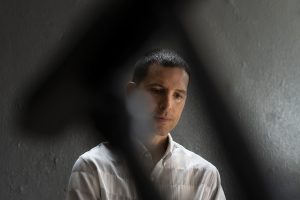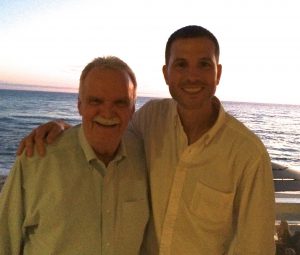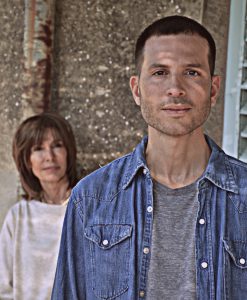 A mother wrote to me: My son got arrested and we hired a lawyer, bailed him out, but he kept using and stealing. He got arrested again and bailed himself out. We knew he was dying so we asked the lawyer to have the judge put him back in jail. We told our son we would not bail him out, that we loved him but would no longer let his addiction destroy the family. All the love in the world was not enough to make him stop.
A mother wrote to me: My son got arrested and we hired a lawyer, bailed him out, but he kept using and stealing. He got arrested again and bailed himself out. We knew he was dying so we asked the lawyer to have the judge put him back in jail. We told our son we would not bail him out, that we loved him but would no longer let his addiction destroy the family. All the love in the world was not enough to make him stop.
My reflection: Dr. MacAfee asked a young man, “What is your drug of choice?” The boy thought carefully and responded, “More.” MacAfee explained, “His answer was not an attempt at humor. Instead, the group answered with a consensus of silence, affirmative head nods. No addict ever intends to end up where he’s really going.”
Today’s Promise: Our suffering loved ones are trapped in the disease of addiction and, although it doesn’t always look like it, they loathe the life they are living. When my son started using drugs as an adolescent, he never thought about the future consequences of his use and how they would destroy his life and relationships. He never intended to ‘end up where he was going.’ I will not feel betrayed. I will not feel self-blame. I will Stay Close in love and prayer.


 Dr. MacAfee wrote, The addiction story is a microcosm of isolation, fear, terror, confusion, and secrecy turned inward on itself in a never-ending litany of questions: “what went wrong?” “who is to blame?” “why can’t you stop?” and “why are you doing this to us?” This drama is far more prevalent than most people realize, until addiction enters our homes and becomes a part of our own stories.
Dr. MacAfee wrote, The addiction story is a microcosm of isolation, fear, terror, confusion, and secrecy turned inward on itself in a never-ending litany of questions: “what went wrong?” “who is to blame?” “why can’t you stop?” and “why are you doing this to us?” This drama is far more prevalent than most people realize, until addiction enters our homes and becomes a part of our own stories. Gabor Maté
Gabor Maté Richard Selzer, surgeon, wrote: I stand by the bed where a young woman lies, her face postoperative, her mouth twisted in palsy, clownish. A tiny twig of the facial nerve, the one to the muscles of her mouth, has been severed. She will be thus from now on. The surgeon had followed with religious fervor the curve of her flesh; I promise you that. Nevertheless, to remove the tumor in her cheek, I had cut the little nerve.
Richard Selzer, surgeon, wrote: I stand by the bed where a young woman lies, her face postoperative, her mouth twisted in palsy, clownish. A tiny twig of the facial nerve, the one to the muscles of her mouth, has been severed. She will be thus from now on. The surgeon had followed with religious fervor the curve of her flesh; I promise you that. Nevertheless, to remove the tumor in her cheek, I had cut the little nerve. Not many people know that my son helps me with every post about addiction. I want to acknowledge his contributions over these many years.
Not many people know that my son helps me with every post about addiction. I want to acknowledge his contributions over these many years. Our beloved Dr. MacAfee said: For the addict, an opening to recovery appears when the pain of maintaining the fiction becomes greater than the pleasure the drugs provide.
Our beloved Dr. MacAfee said: For the addict, an opening to recovery appears when the pain of maintaining the fiction becomes greater than the pleasure the drugs provide. An addiction counselor told me, My biggest challenge is helping clients establish boundaries with the addicts in their lives. Recently, a mother explained that her son, who is actively abusing drugs, lives with her while she cooks for him, cleans his room, and does his laundry. In order to help her take steps toward setting boundaries, I asked her, “Could you quit doing his laundry?” She did just that; however, the son screamed at her and accused her of not loving him. She immediately went back to doing his laundry and quit coming to sessions.
An addiction counselor told me, My biggest challenge is helping clients establish boundaries with the addicts in their lives. Recently, a mother explained that her son, who is actively abusing drugs, lives with her while she cooks for him, cleans his room, and does his laundry. In order to help her take steps toward setting boundaries, I asked her, “Could you quit doing his laundry?” She did just that; however, the son screamed at her and accused her of not loving him. She immediately went back to doing his laundry and quit coming to sessions. Dr. MacAfee, our beloved addiction therapist, wrote: Relatively few people respect the addictive condition as a legitimate life-threatening illness. Rather, there is disgust not only for addiction but for the addicts themselves. This disdain permeates society and emerges from within addicts, honing their stealth and duplicity and their self-hatred. This condition serves to permeate their malady even further.
Dr. MacAfee, our beloved addiction therapist, wrote: Relatively few people respect the addictive condition as a legitimate life-threatening illness. Rather, there is disgust not only for addiction but for the addicts themselves. This disdain permeates society and emerges from within addicts, honing their stealth and duplicity and their self-hatred. This condition serves to permeate their malady even further. Dr. MacAfee wrote: As addicts become increasingly drawn into addiction, their families get drawn into dysfunction. The common dynamic shows the family polarizing and moving into either/or thinking. The addict becomes the major focus for some family members. For others, the addict is a target for rejection, disdain, and fury.
Dr. MacAfee wrote: As addicts become increasingly drawn into addiction, their families get drawn into dysfunction. The common dynamic shows the family polarizing and moving into either/or thinking. The addict becomes the major focus for some family members. For others, the addict is a target for rejection, disdain, and fury.
2 Comments.
View Comments | Leave a Comment